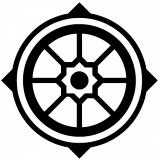Difference between revisions of "Iovism"
Matan-matika (talk | contribs) (using some thoughts on a google doc) |
|||
| Line 55: | Line 55: | ||
Iovism believes that the world is created by the two gods, that are Hosha and Muhe. Hosha is seen as the god of fortune, and Muhe is the opposite. However, neither of the gods represent good nor evil, and both are seen as necessary to the balance of the universe. | Iovism believes that the world is created by the two gods, that are Hosha and Muhe. Hosha is seen as the god of fortune, and Muhe is the opposite. However, neither of the gods represent good nor evil, and both are seen as necessary to the balance of the universe. | ||
==Prayer== | |||
The most common and “general” prayers tend to invoke Hosha and Muhe as a single whole, though there are certain incantations or hymns that refer mainly or exclusively to one. Spontaneous, personal prayer is more likely to invoke an individual deity based on the immediate situation. As the god of order Hosha is invoked far more frequently than Muhe, as people tend to wish for more order in their lives. | |||
==Diet== | |||
There is no actual scripture-based food restrictions but generally there is a taboo on eating meat from birds and land animals that emerged due to the belief in reincarnation. Fish are considered less taboo due to the fact they are considered more distant from humans. | |||
The taboo doesn’t apply universally in all Iovist communities, particularly ones that converted to Iovism later, and many semi-religious or irreligious people won’t obey the rules at all, or use them more as a rough guideline. | |||
[[category:Iovism]][[category:Religions]] | [[category:Iovism]][[category:Religions]] | ||
Revision as of 19:31, 6 January 2021
| Iovism | |
|---|---|
 | |
| Theology | Radical Dualism, Reincarnation, World to come |
| Structure | Monasticism |
| Adriah (Orthodoxy) | Livj Ile |
| Region | Worldwide |
| Founder | The Prophet Iovi |
| Origin | 2nd millennium BCE Modern day Azerin |
| Separations | Orthodoxy, Reform, Ignizian Reform, Aorelian Mysticism |
Iovism is a dualistic religion, centered around the prophet Iovi—from which the name of Iovism is originated—and the gods Hosha and Muhe. Iovism is founded on the 2nd millennium BCE in modern day Azerin. Iovism has also influenced a number of other religions in and outside of Ekuosia, most notably Pashaism and Thaghaism.
Iovism believes that the world is created by the two gods, that are Hosha and Muhe. Hosha is seen as the god of fortune, and Muhe is the opposite. However, neither of the gods represent good nor evil, and both are seen as necessary to the balance of the universe.
Prayer
The most common and “general” prayers tend to invoke Hosha and Muhe as a single whole, though there are certain incantations or hymns that refer mainly or exclusively to one. Spontaneous, personal prayer is more likely to invoke an individual deity based on the immediate situation. As the god of order Hosha is invoked far more frequently than Muhe, as people tend to wish for more order in their lives.
Diet
There is no actual scripture-based food restrictions but generally there is a taboo on eating meat from birds and land animals that emerged due to the belief in reincarnation. Fish are considered less taboo due to the fact they are considered more distant from humans.
The taboo doesn’t apply universally in all Iovist communities, particularly ones that converted to Iovism later, and many semi-religious or irreligious people won’t obey the rules at all, or use them more as a rough guideline.